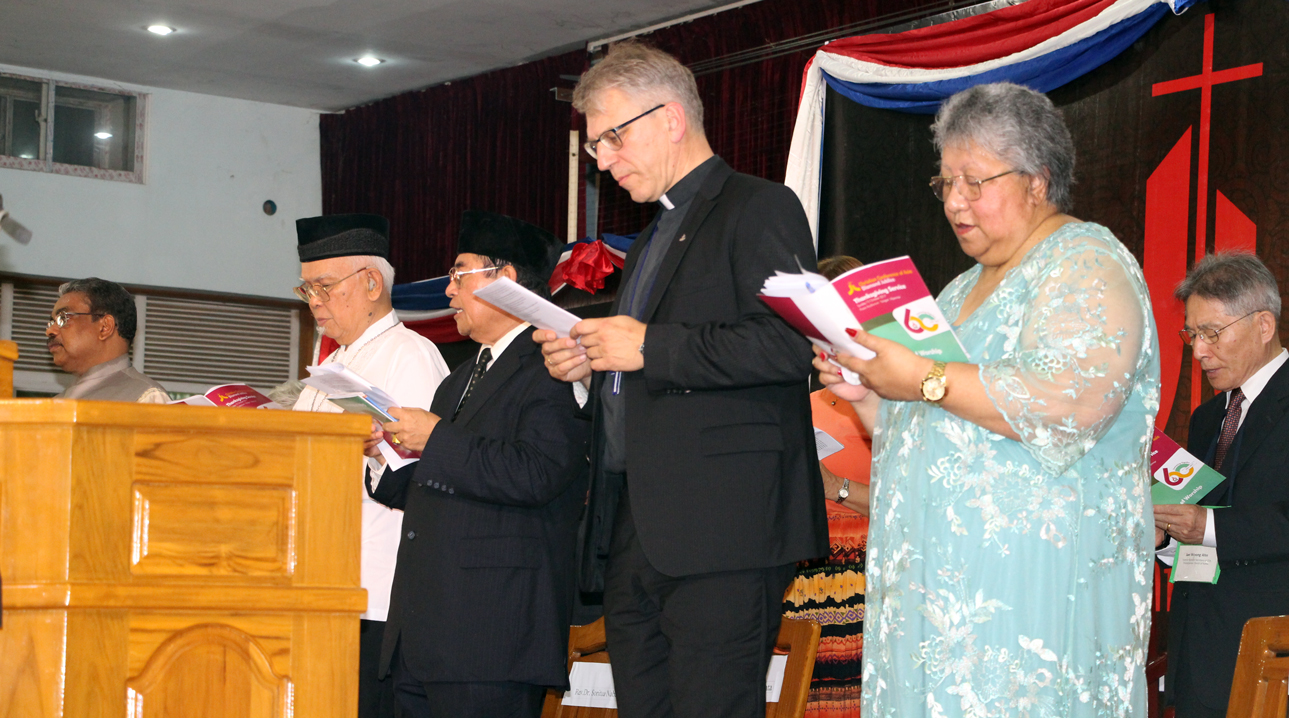WCC General Secretary applauds CCA’s contributions in strengthening ecumenism

"The 60th anniversary celebration is an occasion for both the CCA and the global ecumenical movement to celebrate our common ecumenical commitment in Asia. CCA is a vibrant and living forum continuing cooperation among the churches and national Christian bodies in Asia, within the framework of the wider ecumenical movement. You are participating in the mission of God in Asia – and you are working for the benefit for the wider world," said Rev. Dr Olav Fykse Tveit, General Secretary of the World Council of Churches at the Diamond Jubilee Commemorative celebration of CCA held in the afternoon on Sunday 15 October in Yangon.
Delivering the Diamond Jubilee message on the occasion of the 60th anniversary of the founding of the CCA Dr. Tveit said, "an anniversary is a benchmark on the road, a place to pause and to reflect, but not to stop. It is significant the theme begins with a description of the past that also points to the way forwards”.
“You have been journeying together, and you are ready to move forward together. This is also the literary meaning of mission: To be sent, to move forward, out there, with the people, where God is present as creator, savior, and life giver. That is where we shall reflect the light of God,"
“CCA was founded to find new ways to pursue the mission and the unity of the Church in Asia.
"Mission is our common work, our joint witness, it is God’s mission. It is a response to the call to preach and show that the Kingdom of God is near. It is a journey together to live in reconciliation between God and us, between us, and to share the call to reconciliation. The qualities of these relationships are the expressions of the Kingdom of God; the relationships developed among us should carry the values of justice and peace," WCC general secretary said.
“The occasion of the 60th anniversary of the founding of the CCA is a celebration that reminds all the historic formation of the vital heart of ecumenism in Asia, an organization which was constituted by a
“There are so many forces dividing human beings, but also Christians. It has been an era of profound contradictions, tensions, divisions, even conflicts and wars. There are so many powers and interests that are driving Christians apart, that are breaking down the bonds of fellowship, the qualities of relations among Christians. In this context we need to work together to achieve the goal of ecumenism and ecumenical movement”, Tveit added.
"The world and Asia are in great need of another vision for the future than pursuing only their own interests or building closed units based in political, economical or traditional privileges. We do not need unity that is exclusive, that make the diversity among us to walls of separation, of conflict, even a motivation for violence. Ethnic, national, political and religious identities are used to define who are included and who are excluded. We have to remember that we all have a mixture of roles, relations and identities," Tveit said.
In his welcoming address the CCA General Secretary earlier recollected the role of WCC at the 1957 Prapat Conference and the participation of the then General Secretary of WCC Rev Dr Willem A. Visser't Hooft.
“WCC's accompaniment and support to the formation of the erstwhile East Asia Conference of Asia (EACC), the forerunner of CCA, opened a new chapter in ecumenical and ecclesiastical history as it was the first time that the WCC would play a significant role in the formation of a regional ecumenical organization”.
CCA was the first regional ecumenical organization founded in the world in 1957.










